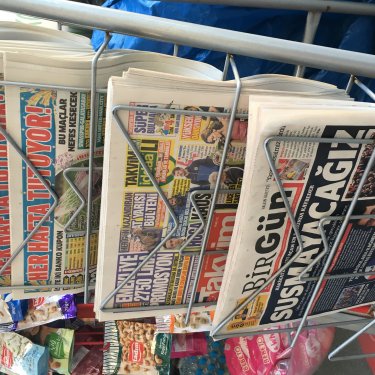Regulators gradually imposing official line monopoly on Turkey’s media

Reporters Without Borders (RSF) condemns an increase in harassment of independent media outlets and “recalcitrant” journalists in Turkey by the leading state entities responsible for media regulation and control, to the point that the government’s viewpoint could soon have a monopoly in the media.
Eighty-five percent of the national media are already owned by pro-government businessmen and toe the official line. But now the climate for independent media has become so hostile that any criticism or independent reporting is being treated as treasonous and anti-patriotic.
Turkey’s High Council for Broadcasting (RTÜK), which consists mainly of representatives of the ruling AKP-MHP coalition, punished Halk TV (People TV) at the start of May for broadcasting an interview in which the head of the leading opposition party in Istanbul said the country should “expect a change of government or even a change of regime.”
Ruling that this comment amounted to “inciting a coup d’état,” the council imposed a five-day ban on the programme that broadcast the interview and ordered Halk TV to pay a fine equivalent to 5% of its monthly earnings from advertising.
This was just the latest in a long list of similar sanctions. FoxTV, Télé1 and HaberTürkTV have all been sanctioned by RTÜK in recent months after broadcasting criticism of the government.
The Press Advertising Council (BİK), a regulatory agency controlled by the president’s office, has meanwhile deprived various newspapers critical of the government, including Evrensel (Universal) and BirGün (Daily), of revenue essential for their survival by imposing state advertising bans for alleged “breaches of ethics.” BirGün was deprived of state ads for 42 days because of articles from August to September 2019 criticizing police violence during protests.
“As the financial crisis worsens as a result of the Covid-19 pandemic and the government seems to be showing signs of weakness, we are seeing a growing crackdown on the news media that aims to turn the official line into a monopoly,” RSF Turkey representative Erol Onderoglu said. “Without democracy and an independent media regulatory system, this crackdown could end up destroying Turkey’s already fragile journalistic pluralism.”
Compliant judges
The government also wields direct control over the activities of many judges, who censor scores of online articles without giving any reason. In mid-February, an Istanbul judge ordered the blocking of 232 articles that had been published online by news sites and other media outlets including Cumhuriyet, Bianet, Diken, BirGün, Artı Gerçek, Gazete Duvar, T24, Odatv, Sputnik Türkiye, Evrensel, Halk TV, Tele1 and Gerçek Gündem.
They all referred to the purchase by finance minister Berat Albayrak, President Erdogan’s son-in-law, of land in Eastern Thrace (Turkey’s westernmost region) through which the government plans to dig a canal linking the Black Sea and the Sea of Marmara.
Threat of press card withdrawal
The Presidential Directorate for Communications (CİB) also uses its control over the issuing of press cards to pressure journalists. According to the Bianet news website, 27 Turkish journalists saw their press cards cancelled during the first few months of the year.
Similarly, around 150 international media correspondents are currently waiting to obtain or renew their press cards. Many German, British, Swedish, French and US journalists are having problems when reporting in the field and constantly risk being subjected to police or administrative controls.
RSF is supporting the Turkey Foreign Media Association’s attempts to get these press cards issued as soon as possible.
Turkey is ranked 154th out of 180 countries in RSF's 2020 World Press Freedom Index.



